Your body is your lifelong home: Own It and Care for It
- Esperantza Rodriguez Vizcaino Rodas
- Apr 7, 2025
- 4 min read
By Genoveva Rodrguez-Castañeda

Your body is your lifelong home. Unlike a house, you can’t sell it, renovate it, or move into a new one. It’s the only place you have to live, and how you treat it today will shape how well it serves you tomorrow. This applies to you regardless of the age you are right now. However, if you are in your 40s the clock is ticking to jumpstart the good habits and take care of your body, so that your 50s and beyond are filled with energy, and you can go wherever you want to go, without physical limitations. The good news? Small, consistent habits can make a world of difference. Whether for better or worse, the little things you do daily add up over time.
The Power of Small Habits
It’s easy to underestimate the impact of small actions. Eating junk food every day might seem harmless at first, but over time it can lead to weight gain, fatigue, and chronic health issues. Conversely, drinking more water, exercising for just 10 minutes a day, or swapping chips for a handful of nuts may seem insignificant at the moment, but can lead to lasting health benefits.

How Our Stone Age Bodies Struggle in the Modern World
Recently, I found myself reflecting on the profound insights shared by evolutionary biologist Daniel Lieberman in his work. He explains how our bodies, shaped by thousands of years of evolution, are poorly adapted to the demands of modern life. From artificial light and endless screen time to sedentary work and packed schedules, our biology simply wasn’t designed for this lifestyle. But perhaps the most striking realization is that our bodies weren’t built to handle the relentless pace of modern life—the endless to-do lists, traffic jams, and constant mental juggling.
In our ancestral past, life was intense but simpler. Physical tasks like hunting or gathering were demanding, but threats like predators or rival groups were sporadic. When the sun set, people gathered around a fire, felt connected, and then rested. Today, we live in a state of chronic fight-or-flight, often leading to adrenal exhaustion—a condition fueled by stress overload and insufficient recovery time.

The Path Forward: Simplify and Nourish
The solution isn’t about trying to mimic our ancestors’ lives—it’s unrealistic and unnecessary. Instead, it’s about simplifying our daily routines and prioritizing habits that allow our bodies to rest, recover, and thrive. By focusing on small changes that align with our natural needs for movement, nourishment, and relaxation, we can counteract the mismatch between our biology and modern life.
The Addition of Small Changes Make a Big Difference
Here are some actionable tips to help you start living in harmony with your body:
1. Cook Your Own Meals

Home-cooked meals made with fresh ingredients are one of the simplest ways to nourish your body. If you’re new to cooking, start with easy recipes or collaborate with someone who enjoys it. Cooking allows you to control what goes into your food while fostering a deeper connection with what fuels your body.
2. Stay Hydrated

Carry a water bottle and aim for at least 8 glasses of water daily. Proper hydration supports digestion, energy levels, and overall health.
3. Move More

Incorporate small bursts of activity into your day—take the stairs instead of the elevator or go for a 10-minute walk after meals. Regular movement helps counteract the sedentary nature of modern work.
4. Build Muscle

Strength training becomes increasingly important as we age. Focus on building muscle through bodyweight exercises or light weights to maintain mobility and prevent age-related decline. 1 in 4 people over 70 die within a year of having a hip fracture, with the leading cause of hip fractures being falling and being frail (a.k.a accidents happen but what makes it worse is not having enough muscles to support their body and breaking bones).
5. Prioritize Sleep

Aim for 7–8 hours of sleep each night or incorporate a midday nap if needed. Mathew Walker explains that our sleep cycles are naturally bi-phasic; that means that we are meant to sleep twice a day, so adding a siesta can enhance relaxation and recovery. In fact, Dimitrious Trichopolous found that Greek men who napped at least 30 minutes a day were significantly less likely to die from heart attacks, compared with those who didn't nap.
6. Limit Screen Time

Replace scrolling on your phone with stretching or dancing to your favorite song. These small shifts improve mood and physical flexibility. And add life to your years!
7. Avoid Processed Foods

Gradually replace processed snacks with whole foods like fruits, nuts, or seeds. This change improves energy levels and reduces cravings over time.
8. Practice Presence Daily

Dedicate time each day to activities that ground you—whether it’s meditation, singing, dancing, gardening, fixing the car or radio, or journaling. These practices ground you in the present moment and reduce stress while fostering gratitude for life.
Why does any of this Matter?
These small habits may seem trivial or repetitive at first glance, but small changes compound over time to create lasting change—for better or worse. By consistently prioritizing your health through manageable steps, you’ll find yourself feeling stronger, more energized, and better equipped to enjoy the life you have.
Remember:




Comments